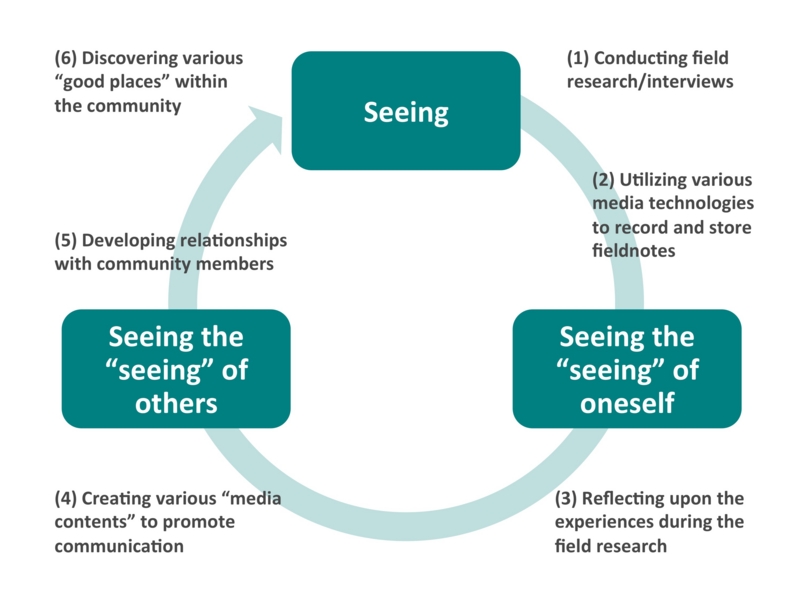Hong Kong Camp: Overview
It has been nearly three years since we conducted a "camp," outside Japan, in Helsinki, Finland. A "camp" is a mode of participartory learning, in that participants seek to understand the resources available, and attempt to expand their capacities to organize their ideas within given situations. It is an attempt to design a place at which we can reflect upon things that are regarded as 'taken-for-granted' in our day-to-day activities.
I suggest that such form of learning may promote communication among participants, through the set of goals, roles, and rules that constructs the situation. This year, we will make a short trip to Hong Kong. For Keio students, It will be offered as a "Special Research Project B" for the Spring Semester, 2015.
We plan to collaborative with the students of the City University of Hong Kong, under the guidance of Dr. Elaine Au Liu Suk-ching. (Details to be announced)
- Dates: Saturday, February 28 - Wednesday, March 4, 2015
- Venue: 美荷樓 YHA Mei Ho House (Block 41 Shek Kip Mei Estate, Sham Shui Po, Hong Kong)
-
Participants (fklab, Keio University): Taishiro Akiba, Takumi Fukasawa, Erika Hiyama, Kei Ito, Fumitoshi Kato, Yuiko Kuwabara, Chiharu Konoshita, Joyce Lam, Kenta Ogawa, Mayuru Ozao, Takashi Saito, Riki Sasano, Yuri Tanaka, Mari Tsuchiya
On the idea of "camp"
A "camp," as a mode of learning, consists of three steps that are closely interrelated. Each step has its own emphasis in terms of our process of knowing. The design of the learning process is primarily based on the theory of experiential learning, and it unfolds as three steps. As shown in the figure below, these three steps of the "camp" create a cyclic process. Typically, participants work in groups of two, in that one can concentrate on taking photos while the other can work on generating fieldnotes.

1: Get in touch with people
In the first step, we conduct interview sessions with members of the local community. A primary purpose here is to listen to the "real" voices of the ones who live their lives in the community, and collect and compile data (i.e., include photos, voice-recordings, sketches, and other forms of fieldnotes). It can be understood as a pile of "life documents," with which one can begin to weave a story about his/her experiences in the area. Through this phase, participants will learn about the ways in which he/she can get closer to the interviewee, and to develop the relationships with her/him in the given situation.
2: Making sense out of interview sessions
The next step of the "camp" is to reflect upon the interview session, and to think about the person interviewed, and her/his day-to-day activities in the community. After the fieldwork, participants are asked to select photo(s), and to come up with a catch copy, phrases, short texts to illustrate the situation created by both the interviewers and the interviewee. As a form to organize and present this process of understanding, we create a set of posters. Through this process, one has to distanciate oneself from the situation within which he/she was embedded. It triggers a mode of self-reflection, in that one has to look back and make sense of things and events he/she observed during the fieldwork.
3: Sharing posters with interviewees
When conducting a field research in a local community, it is important to deliver the result of the research back to the community members. As mentioned, as a way to distribute the images of the person (that is, in fact, the images of the community) the photos, phrases, and texts are organized into a set of posters. I suggest that a poster is a distinct, useful medium for presenting one’s experiences in the field. By delivering and sharing these posters, one can begin to further develop the relationship with the interviewee. This process initiates to pursue additional interviews, as well as to incorporate new participants for the future research activities. Also, this cyclic process may expand the scope and perspective of the research itself.
Schedule (tentative)
※2015年2月28日(土)〜3月4日(水)現地集合・現地解散です。
Day 1: Saturday, February 28
- 13:00 Arriving at Hong Kong
- 18:00 Get together - Meeting in brief @Function Room, Mei Ho House
- 20:00 Dinner @Hing Kee Restaurant 興記煲仔飯(15-19 Temple Street, Yau Ma Tei, Hong Kong)
Day 2: Sunday, March 1
- 10:30-10:45 Introduction - City University of Hong Kong (City-Youth Empowerment Project) @Academic Building 1: Y5-306 (yellow zone, 5th floor)
- 10:45-11:00 Introduction - Keio University
- 11:00-11:30 Ice-breaking session
- 11:30-12:30 CityU Tour
- 12:30-14:00 Lunch
- 14:00-15:30 Casual interview-walk through Nam Shan, Shek Kip Mei (Local community)
- 15:30-16:00 Wrap-up
- 18:00- Dinner
Day 3: Monday, March 2
- 9:30- Field research in Hong Kong; Designing posters(グループごとに行動)
- 12:00-13:00 Lunch
- 15:30 Meet @Choi Hung Station
- 16:00-17:30* Agency visit (Kwun Tong Youth Centre)
- 18:00- Dinner
Day 4: Tuesday, March 3
- 10:00- Visit Heritage of Mei Ho House Museum(美荷樓生活館)
- 11:30- Field research in Hong Kong; Designing posters(グループごとに行動)
- 16:00 Poster designs due; Printing out
- 19:00 Dinner Meet @Sha Tin Station
Day 5: Wednesday, March 4
- 10:00* Presentation; Debriefing session; Reflection (video session) @Academic Building 1: Y5-306 (yellow zone, 5th floor)
- 11:30 Wrap up
【特別研究プロジェクトB】
Design and Practice of Community Research:コミュニティリサーチのデザインと実践
本研究プロジェクト(特別研究プロジェクトB)は、地域コミュニティの調査方法の設計および実践について、フィールドワークやワークショップをとおして学ぶものである。City University of Hong Kong (Department of Applied Social Studies) で展開されているCity-Youth Empowerment Projectとの交流・視察をふくめ、コミュニティリサーチの思想や方法の多様性について学ぶ。参加者は、香港でフィールドワークやインタビューをおこない、滞在中に成果をまとめて報告する。
- 2015年2月25日(水)オリエンテーション(@SFC)
- 2015年2月28日(土)〜3月4日(水)フィールドワーク・インタビュー(Hong Kong)
- 2015年3月10日(火)講評とふり返り(@SFC)